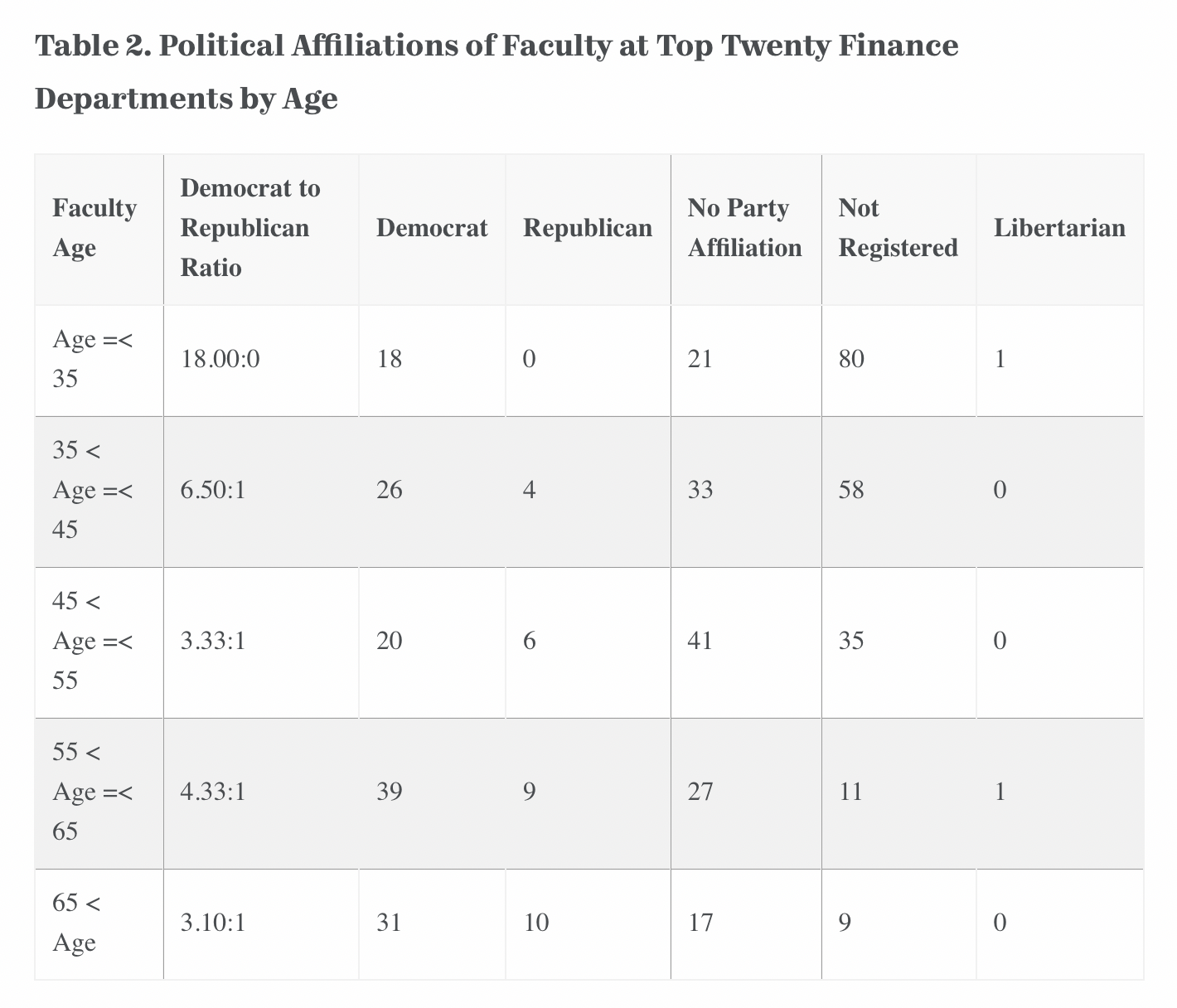In response to my latest Loose Ends item that mentions that the Harvard faculty self-reports to be 80 percent liberal (an underestimate in reality), a commenter suggests: “No guarantee, of course. But if you want to find a conservative professor, search out the Finance Department or equivalent.”
Well, bad news I’m afraid. From the Summer 2021 edition of Academic Questions, the quarterly journal of the National Association of Scholars:
Even Finance Professors Lean Left
Emre Kuvvet
This analysis of the political party affiliations of faculty at the top twenty finance departments and of the editorial boards at the top three finance journals shows that both institutions lean considerably to the left. Results also suggest that finance departments will become even less politically diverse in the future. . .
New York University is ranked number one among finance departments in the U.S., with Harvard University coming in at number two. Both institutions have a political affiliation ratio among faculty of 10 Democrats to 1 Republican. (At NYU, eight faculty have no party affiliation and thirteen are not registered to vote.) In other words, for the top two ranked finance departments in the country, for every Republican there are 10 Democrats among the faculty.
There’s more like this in the article. Here’s the table Kuvvet put together for the article (which explains fully his methodology and data sources):
It gets worse. Younger finance faculty skew more to the left than that total faculty, as Table 2 shows:
And the leading academic finance journals are run by editors who skew left, so expect lots of articles on the glory of ESG investing.
You will note in the totals at the bottom of the first table that the number of finance professors who are not registered to vote or have no stated party affiliation outnumbers professors who do have a party preference. Perhaps these are professors who lean right, but don’t want to disclose it, which is commentary all by itself. Lacking data, this article doesn’t speculate.
To be sure, when I was in college back around the time of the Boer War, my finance professors were all conservative Republicans, but they weren’t regular academics. The two finance professors I had were not conventional academic Ph.Ds, but MBAs who had come to teaching after long senior careers on Wall Street. In other words, they actually knew from experience, and were excellent classroom teachers incidentally. (Of course I would think this: I got the top score in my corporate finance class as an undergraduate. And yet for some reason decided to study political philosophy in graduate school. Oh well.) One notable feature: being practicioners, they didn’t publish anything in academic journals.
Part of the problem with universities is that they have fewer permanent, tenured faculty drawn from the real world. Today the ranks of even finance professors will be drawn from purely conventional academic backgrounds, where “publish or perish” is prized over classroom teaching. The “publish or perish” regime is fine for major research universities (though not in all disciplines, such as finance!), but the problem is that this rigid model has trickled down to liberal arts colleges, and has badly diluted their primary teaching mission. Today the publication record of most liberal arts college faculty look just like the specialized publications of major research faculty, i.e., esoteric and boring.
This is one among the very many problems afflicting higher education. I happened to run across an apt comment on this point from Hannah Arendt, from a 1972 conversation of several senior academics convened by the Rockefeller Foundation:
Really good teachers are not thought of highly by the academic society. This business of “publish or perish” has been a catastrophe. People write things which should never have been written and which should never be printed. Nobody’s interested. But for them to keep their jobs and get the proper promotion, they’ve got to do it. It demeans the whole of intellectual life. I used to adhere to the principle that a graduate student on a certain level should be independent from me to the extent that he could also, apart from me, choose and establish his own bibliography. This is absolutely impossible today because there is such an amount of sheer nonsense on the market that you cannot ask a student to review it. He will spend years in the library until he finds the few really important books in the field.
The one who really loses is the person who has a passionate interest in matters of the mind, who is an excellent reader, who can establish contact with his students and make them understand that his subject is important, but who will not write. Or, if he is forced to write, will not write well. And, by doing something which he is forced today because of “publish or perish,” he will become a lesser person.
Arendt did add that “the so-called charismatic teacher is usually a disaster.” Arendt, I am told, was not herself a very charismatic teacher in the classroom, and her lectures could be rather turgid. But the discussions after were golden.
(This Arendt passage not available online. I found it in an obscure collection of some of her uncollected short works, Thinking Without a Bannister: Essays in Understanding, 1953 – 1975, p. 442.)


Notice: All comments are subject to moderation. Our comments are intended to be a forum for civil discourse bearing on the subject under discussion. Commenters who stray beyond the bounds of civility or employ what we deem gratuitous vulgarity in a comment — including, but not limited to, “s***,” “f***,” “a*******,” or one of their many variants — will be banned without further notice in the sole discretion of the site moderator.